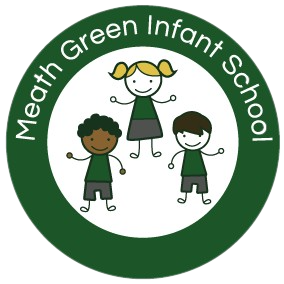Maths
Why is maths so important?
At Meath Green Infant School, we believe that mathematics is a fundamentally important area of the curriculum. Maths gives children the opportunity to investigate, reason and solve problems and also gives them the tools to use across other areas of the curriculum. Our teaching of maths encourages children not only to understand how to work mathematically, but also why different mathematical methods work. This enables children to develop a deeper understanding of the subject and to apply their maths more confidently and with better understanding in a wider range of contexts, and make links between subjects and the wider world. Maths enriches other subjects and enables children to see their mathematical learning put to use in other areas.
We endeavour to ensure that the maths curriculum we provide inspires children to be excited about maths, solve problems with a 'have a go' attitude and develop good fluency within their work in order that they can apply their mathematical learning with confidence.
How do we teach maths?
The maths curriculum at Meath Green Infant School has been planned to ensure that all children are given the opportunity to work practically with a range of equipment, models and images to help their understanding of mathematical concepts. We follow a concrete-visual-abstract approach as children's understanding develops within a concept. Initially, when children are first introduced to a new concept, they are supported by concrete apparatus; for example, using a tens frame and double-sided counters to add two single digit numbers beyond 10. We use a wide range of equipment to help children develop a secure understanding of mathematical concepts; we believe that equipment such as number lines, tens frames, part/whole models, place value equipment etc. can help children to 'see' how maths works. They then move on to a pictorial representation, e.g. drawing a number line to show adding two numbers beyond 10. Finally, when they are secure, they move to abstract representation; for example, recording only a number sentence and the answer.
At Meath Green Infant School, we use the White Rose Maths scheme of work as a basis for our maths planning, This is enhanced with activities from the NCETM (The National Centre for Excellence in the Teaching of Mathematics) alongside other reliable sources. Within each unit of work, there will be coverage of a range of reasoning, problem-solving and fluency activities.
We also ensure that children know and remember more by making sure that key aspects of the subject are returned to several times; each time at a deeper level to ensure that children develop their understanding through all areas of the subject. Overlearning is also apparent in planned oral and mental lesson starters. In this way, children are prepared well for future stages of learning where they will meet these aspects of maths again within new contexts.
Children are taught using a range of methods and resources in order to be able to select the most appropriate resources to complete a task with developing independence. The maths learning environment is designed to give children open access to resources. Each classroom will have a maths ‘working wall’ which will be updated to reflect the current unit of work and should display key vocabulary models and images and examples of children's work. Each class will make use of the outdoor areas for the teaching of maths and throughout EYFS, maths activities linked to the current unit that are available through continuous provision. ICT is also used to enhance appropriate learning opportunities in maths.
Effective quality first teaching is the key to enabling all children, including children with SEND, to participate and develop their mathematical knowledge and skills. Misconceptions that arise are addressed immediately in order to close gaps in learning. If there is a need, children will be given additional maths support through targeted interventions.
What do we hope to achieve?
Through the delivery of our mathematics curriculum, we expect our children to be fluent in the fundamentals of mathematics, have a deep conceptual understanding and have the ability to recall and apply knowledge rapidly and accurately. The children will be able to reason mathematically by following a line of enquiry, and develop an argument/justification or proof using mathematical language. They will also be able to solve problems by applying their mathematics to a variety of standard and non-standard problems with increasing sophistication.
